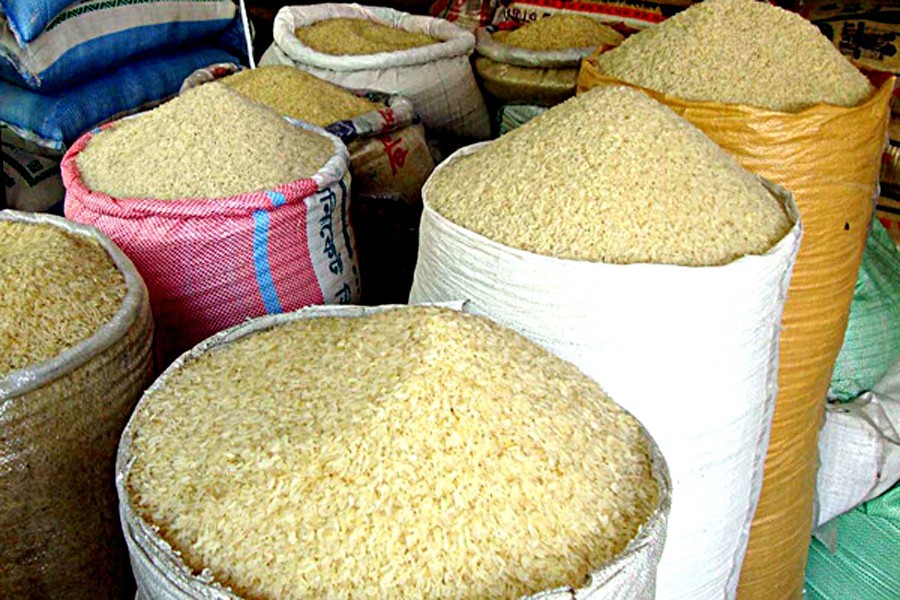Spiralling input costs for Boro cultivation coupled with a big drop in Aman paddy price have left farmers in dire straits this year.
As a result, the Boro cultivation acreage might decline in this Boro season, which could prompt price volatility in coming months, experts said.
Boro and Aman yields account for 55 per cent and 38 per cent of the total rice supply in the country respectively.
According to the Department of Agricultural Marketing (DAM), Aman paddy prices fell to a three-year low this harvesting season in Rangpur, Rajshahi, Pabna, Bogura, Kushtia, Jashore and Barisal regions.
Presently, the Aman paddy was selling at Tk 14.50 to Tk 16.25 per kg (Tk 580-Tk 650 per maund), which is even 32-40 per cent lower than the government-fixed procurement price.
The government has been procuring rice at Tk 36 a kg from the millers considering the paddy price to be Tk 24, according to the Directorate General of Food (DGoF).
The Department of Agriculture Extension (DAE) data shows that some 60 per cent of Aman harvest has been completed as of November 29.
Md Abdur Razzaqe, a farmer at Mulia Bazar in Narail Sadar, told the FE recently that he was struggling hard to arrange money for Boro cultivation in the wake of slump in Aman prices.
He cultivated Aman crop on his five bighas of land (1.0 bigha equals to 33 decimals in his area) and harvested 76 maunds of paddy in the first week of November.
Razzaqe said the production cost was estimated at Tk 56,000 (excluding his self labour), but the market price of the produce is Tk 42,000-Tk 43,000.
The prices didn't increase despite the announcement of the procurement of rice by the government, he said.
He also said, "I have to keep a stock of 25 maunds of paddy to feed my five-member family for the next five months."
Mizanur Rahman Maznu, a farmer at Itakhola Union under Nilphamari Sadar Upazila, told the FE over mobile phone that most rice growers have now been forced to sell their crops at a lower rate as they need money badly.
The costs of Boro cultivation inputs such as irrigation, fertilisers, seeds and labour have increased 10-30 per cent in this Boro season, he said.
Maznu said he got 45 maunds of Aman crops from his three bighas of land this year and sold off all the produce at Tk 28,000 to buy Boro cultivation inputs.
Now, he needs about Tk 52,000 for Boro farming, said the dejected farmer.
Many of his fellow farmers are now trying to seek loans from NGOs and local lenders, he added.
"And many others are switching to other crops like maize and vegetables," he said.
Md Zainal Abedin, president of Bangladesh Agricultural Farm Labour Federation (BAFLF), told the FE that the irrigation cost has increased by Tk 150-Tk 200 per bigha in this Boro cultivation season.
He said local fertiliser dealers were also charging a higher rate for urea, MOP, DAP and TSP. They have increased the rate by Tk 2.0-Tk 3.0 per kg, ignoring the government-fixed rate.
Farmers across the country claimed that union level dealers were selling fertilisers at Tk 18-Tk 19 per kg instead of government-fixed rate of Tk 16.
Farmers were also sourcing seeds at higher rates from the private seed sellers, as the dealers of BADC (Bangladesh Agricultural Development Corporation) had limited supply of seeds this year.
The government didn't buy a single gram of cereal directly from the farmers in the last ten years despite its announcement, said Zainal Abedin.
Dr Md Asaduzzaman, professorial fellow at the state-run Bangladesh Institute of Development Studies (BIDS), told the FE that the country has now a good supply of rice.
But the supply might witness a crunch in the middle of next year if a section of farmers skipped Boro farming this season, he said.
He pointed out that farmers got some profits both in Boro and Aman seasons in FY 2016-17 which helped the country get record output in FY 2017-18.
But such lower price of Aman crop in this FY 2018-19 might discourage farmers to grow Boro on a large scale, he said.
He also suggested that the government should declare compensation immediately for the farmers who lost their capital in Aman season.
Cash incentives should also be provided to farmers to encourage them to cultivate Boro for the rice security of the country, he added.
"The government should be well aware of the factors that led to the abnormal price hike of rice last year," he said.
According to the State-run Trading Corporation of Bangladesh (TCB), rice prices shot up to an all-time high of Tk 54-Tk 55 (coarse) and Tk 75-82 (finer) a kg in September-October period in the city last year.
However, the prices are now Tk 40-Tk 42 (coarse) and Tk 60-Tk 70 (finer) a kg.
According to the monitoring unit of the DAE, the government has targeted to produce 19.5 million tonnes of rice on 4.8 million hectares of land in this Boro season.
The DAE had also targeted a 0.42 million hectares of seedbed across the country, of which 70 per cent have been achieved so far as against 78 per cent in the corresponding period of last year.
Meanwhile, a total of 15 per cent Boro cultivation has been completed in the country as of November 29 as against 22 per cent in the same period of last year.
The country saw an all-time high production of rice -- 19.45 million tonnes -- in the last Boro season.


